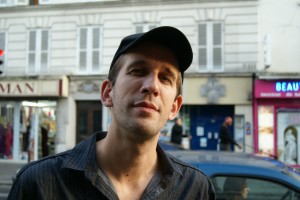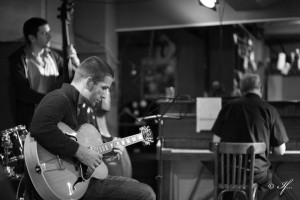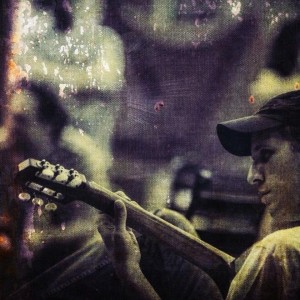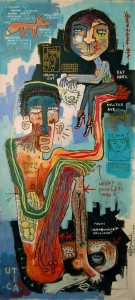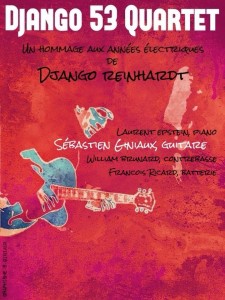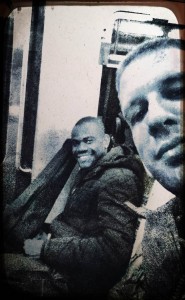By Michel Mercier
One of the most outstanding and original players to have appeared in the gypsy jazz scene, Sébastien Giniaux has a truly eclectic, versatile training and career. The Selmer 607 album revealed him to a broader audience, but his musical journey started at a very early age and brought him to the highest sphere of Jazz manouche. A unique and unpredictable personality, Sébastien Giniaux is as free as can be in his life and career.
First, please tell us about your discovery of music and training…
I grew up in the southern suburbs of Paris, in Bourg-la-Reine. I started at the age of 5: music for kids at the music academy, clapping hands and stuff… Then you’re asked about what instrument you’d like to play. I didn’t really know, my elder brother was playing the violin for 4 years so I said ”ok violin, is fine”. But I didn’t want to play in a standing position, I was seeing him playing in his room, standing and it pissed me off. So I thought to myself “seated violin” and that’s what I said to my parents. They answered “terrific! We’ve got something great for you” and I started cello. That wasn’t really a choice, I was only 5… I then went to the music academy until I was 18 years old, and then to a music school and then to the CNR in Boulogne Billancourt. Besides that, I met some people when I was 12 or 13 years old, like that guy named Babx (quite a famous songwriter and of the “chanson française” scene), we became very good friends. His mother is an ethnomusicologist and she had a school where she taught traditional singing. I started to listen to tsigan songs and a lot of other stuff. There were a lot of records there: qawwalî music, african music, lots of things… so I worked a bit in that school, I worked on songs with Babx and when I reached 16 I started playing a few folk music chords on guitar to accompany a friend that was playing irish music on the violin: basically E minor an D major.
And in that school Kamlo (Barré) used to do masterclasses. I saw his manouche guitar, I didn’t know about it at all and I was struck by the sound of that guitar. After that I owned another folk guitar which I tried to convert as a gypsy guitar… It was a bit ridiculous because it had a regular folk bridge and I had put a gypsy guitar tailpiece on it… that was really random… I didn’t have a dime to buy a guitar. Then when I was 18 a buddy of mine called Pierrick Hardy, a great jazz guitar player and teacher who plays on a Lowden folk guitar, phoned me. He had an opportunity to buy a 1976 Jacques Favino but got his amps and gear robbed so he found himself broke and couldn’t buy it. It was a friend of his who was selling it for 1000 francs (150€) so he told me I could have it if I put down 200 bucks (30 €) more. That way he was happy that the guitar remained in the circle of his friends so I bought a Favino for 1200 francs… So I got this and I started to practice that gypsy jazz style. We had already started quite a confidential band with Norig, playing in tiny venues. Things went on and, little by little, I stopped cello for 3 years. When I finished the music academy I had worked with a band, “l’orchestre de l’oratoire du Louvre”, did some contemporary music projects and a few other things…
When I really got into guitar I stopped all that. I worked and played like crazy for 5 years.
You also play other instruments, right?
I learned the piano because I compose a lot and was also interested in classical music composition. It’s quite useful to have some basic piano skills even if I’m not a proper piano player.
And double bass as well?
Yes double bass is funny because it’s the same approach as cello but tuned like a guitar so it’s quite easy to handle if you have some basic musical knowledge, the process is rather quick.
Would you advise musicians to learn several instruments?
Well it all depends on what you’re looking for, but to me, generally speaking, being open-minded is important for a musician and not only about the instruments but also with different styles of music. Jazz manouche, and the many other styles I’ve been involved in, feel to me like closed circles. I’ve always had some kind of punk attitude with that: due to my background I’ve always been interested in many different styles of music. The richness that I think I have in my own music comes from all of that: my playing of several instruments, the inspiration I get from things I don’t know well. So well, yes, I would recommend all musicians to listen to music as a general thing, not as a particular style. See how Django was keen on Ravel, Debussy, African-American jazzmen… Take “Sketches of Spain” from Miles Davis or Chick Corea’s music. All the great musicians, regardless of background, took their inspiration from numerous sources. That concerns jazz but not only: the cello suite from Bach, like the Sarabande for instance were originally popular dances, usually played on a hurdy-gurdy!
Speaking about Django, and jazz manouche… To me Django’s music is not jazz manouche but as far as jazz manouche is concerned, one still has to start by learning the basic idioms of the style, right?
Yes, totally. To me it’s a great guitar school, a “French guitar school” as would say my cousin Christophe Lagane (luthier and musician). That’s why I went so deep into it, it was a great way to learn the instrument but they are so many different schools… That’s what I like with the guitar: just go over the bridge, cross a border and you’ll find someone playing it differently, you won’t even understand what he’s doing! When you go in Granada, they play the same instrument but you don’t get it at all… Different right hand, rhythms, chords… you don’t have that on every instrument: playing the piano is just playing the piano… there are different styles but only one technique, same with the cello. With the guitar, you’re confused every time you change country and that makes a lot of things to work on and be interested in. That’s exciting!
But indeed Django is not specifically jazz manouche to me.
How did you get to know Django?
Backwards… I think I knew “Minor Swing” or “Les yeux noirs” like everybody, as a part of our popular culture. I met Kamlo… the first record I got was given to me by Sébastien Gastine (bass player and brother of rhythm David Gastine), it was Matelo’s “Tziganskaïa”. I listened to it so much, I was a real fan but I was not listening to Django. Then I listened (a lot and for a long time!) to Angelo’s “Gypsy Guitars” and a bit of Django but it wasn’t striking to me. Maybe it was a matter of sound or just a matter of me being stupid, that’s also a possibility! Then I listened to Romane and Stochelo’s “Elegance” and later I started buying and really listening to more of Django. There it was: a big slap in the face…
Why that big slap in the face?
Because it’s pure. First, there’s a dynamic that you don’t find elsewhere. Well I don’t want to bash him but I think it’s because of this vintage sound. For instance Matthieu Châtelain, who’s part of a HCF style Quintette with Gwen Cahue, tried different EQ filters on some of their recordings. When you listen to the basic recording (and note that they even cover some complete Django and Grappelli solos) it sounds good but just as any Gypsy Jazz recording. When filtering the guitar is suddenly boosted, with different frequencies… So I guess it was both something from Django and something from that vintage recording making people feel special about him.
But the sound of Django’s last recordings was excellent and clean?
Yes but it was not “manouche”, it was more modern. Not to say it wasn’t amazing because as an improviser it was indeed awesome but until 1945, a lot is due to the way it’s recorded.
I guess you also listened to Fapy’s recordings?
Yes of course…quite dazzling and Django…quite so and so. (laughs)
What’s your opinion about Jazz manouche today? Is it too closed? Are there some fusions that you like?
Generally speaking I think that many things are too closed, not only in jazz manouche… Well there is something special when you go in a gypsy campsite with some friends, when the playing is genuine and… you see that it’s really a culture, it’s deep and it’s also a political thing because that’s the only good thing they can show to the world to avoid being despised. Now that it’s hip again, it’s a kind of flag for this community so I understand that they want to keep the tradition, I think it’s a good thing. And there are a lot of people within this community like Bireli or Angelo that try to mix that music to something else, more modern and make it evolve… but yes, I love jazz manouche, I love to meet friends in a bar and jam for hours. Now, as a musician and regarding all the different things I’ve made so far, I wouldn’t feel like making a record where I’d play “Minor Swing”. That’s my own vision, everybody has to find their own way through that. I fully understand those wanting to keep the authenticity of what’s been built since Django. By the way, it’s very interesting.
What would be, in today’s gypsy jazz scene, the players that impress you the most and those who you particularly like to listen to?
Well myself, I love my own playing by the way… just joking! Bireli of course. Bireli and Angelo are the two players I like to listen to, and for completely different reasons. Bireli always had this playful and easy approach on the guitar, though I guess he worked like crazy to be able to do that but he’s always into ingenuity and playing (in the literal sense)… Nice and beautiful! I love Angelo because he’s not here for fun, he takes music seriously and has so much lyricism. It’s really different. I think he found something extremely expressive, especially since he’s been playing with that dirty amplified sound… Each time I listen to him I’m staggered by the emotion he brings. There’s also Rocky Gresset who I love to listen to and play with. We’ve been having those “tonight I’ll kick your ass” kind of jokes for a long time but Rocky’s really not into competition. He pushes you to play music, otherwise he gets bored. You don’t have other choice than listening closely and doing your best with him. Anyway Bireli and Angelo would really be the guitarists that influenced me the most.
Does that mean you also got a purple Dunlop pick when seeing “Live a Vienne” DVD (laughs)?
Completely, immediately (laughs). I got one but also started playing with the round end which changed a lot of things.
Does it really make a difference?
What I tell to my students is that cello players have a meter of bow to produce some sound. With a pick you’ll have something like 1,5mm … it just makes “click” and then you can go home (laughs). That’s the problem of acoustic guitar. Playing with the round end brings two things. First: more space to produce the sound, because you can do it on 1 cm by inclining the pick, just like playing a bow. That way you can have something “fatter”, closer to a tortoise pick’s tone. Second: it allows you to play sweeps and play in a more precise way that the old fat pick. Sweeping with a 5 mm pick is just terrible, I wish you the best with it! So that round end playing allows both to play modern style and get a fat tone when needed.
Do you still practice your guitar?
Yeah, definitely.
What would you do on a regular practice day?
Same as I always did. When I started I used to put a record on and play over it, like playing ugly solos over Angelo (laughs)… if he only knew that… I hope my solos are not so ugly now but that’s what I do. I play records, try to set myself upon the rhythm section and find the chords if the tune is new to me… I play and try to pick up whatever pleases me. I also practiced my arpeggios like hell but not anymore. So when I listen to a solo (and it can be Angelo or anybody else: Charlie Parker, Vivaldi, whatever piece of music that makes my ear wriggle) I try to transcribe it in order to understand the harmonic path and find why I liked it. That way you don’t only get the phrase, but the whole harmonic process which you can then play with all over the neck.
How do you feel now that, having reached the circle of top players, you’re the one being transcribed?
First I’m thinking “are they stupid or what?” (laughs)… It all depends on your inner state. I regularly have moments of doubts about my work. As I’m much into creation and original projects, I often wonder if it’s worth it… So in those moments, when I think about people transcribing my solos, it means to me that I still managed to do something worthy, it comforts your ego… and at other moments I think they’d better transcribe Charlie Parker (laughs)! But really, I never thought I would reach such a position in the scene. For instance there’s that guy, Harry Edwards from Tasmania (a totally remote place!) who sent me a “Suite for Giniaux” on Youtube … all the way from Tasmania! That’s touching, I‘m very happy with that… and my parents too!
You’re also into painting, what does it mean to you and how did you start?
As a child, you’re happy to do whatever you get encouraged for. It was quite natural for me as my parents liked my drawings. My family had no tv so we did lots of manual activities, sharing color pencils and stuff, making wood constructions… Our Christmas gift was an orange (laughs)… No we were spoiled, really, but there was a will of creative education. That’s why my parents sent us to the music academy. My parents are not trained musicians, just music lovers who like to sing. Anyway they encouraged me when I started drawing portraits of them, horses, etc…
In High school, I used to draw comics but I always got bored after 3 pages… A friend of mine used to write the scenarios and they were so lame (laughs)! So I never finished a comic but I did that a lot, also portraits of girls I wanted to date… I was quite good at realistic drawings: birds, portraits… I was really passionate with birds, drawings tons of them.
From 8th grade my scholarship really became chaotic, I didn’t know what I was doing there anymore… I passed the Literature/plastic arts Baccalauréat (main french High School diploma), also known as the “crook Baccalauréat” because the Painting exam has a coefficient of 9. You can fail all the other topics (like I did) and still earn your diploma. Anyway I had a great plastic art teacher in that class, Madame Rolley. She only taught modern art, starting from early 20th century: Picasso, Marcel Duchamp. I didn’t know a thing about modern art and she changed my life. Suddenly I understood that painting could be something going beyond the visual dimension, and I was passionate about it, painting a lot.
I put it aside when I began my career as a musician: too many projects, not enough room in my apartment. When I started to work on my album “Mélodie des choses”, I thought it would be good to see what I was able to do and I went back to painting for one and a half years. To me, music and painting are just ways of expression: telling about your life or criticizing people’s life, saying what you have to say. Both arts are complementary to me because music is quite a socializing thing and I’m not always the socializing kind of guy. It’s a good Yin and Yang thing so I can appreciate going out with people as much as staying on my own. Painting is something quite anarchic to me. With my training in music I learned rules that I now like to break. That’s the logical way to me, learning to build something that you later learn to break. With painting, I worked alone and had to create my own technique, with my own influences. I feel freer as a painter than as a musician. Breaking the boundaries is fun but takes a lot of energy. Everything feels brand new and fresh when I’m painting, I don’t always feel this way with music…
Being a complete artist, would you say that artists have a role in society? What would it be?
I think it’s a complicated question…
I’m asking you that because you express personal things in your paintings but also political matters, right?
Politics is now a career, but at the beginning it was really a citizen’s duty, everyone should feel concerned about it. I don’t see myself as an artist. I feel more concerned by the good sides of politics, I feel more like someone revolted than an artist. We are in a period where people gave up on politics (which you can understand) so I think to myself “why not try to give some messages”. Being on stage, I have access to an audience. You have to be careful but from there you’re sure to have 2000, 200 or even 20 listeners. As I play instrumental music (I’m not a songwriter) I tend to take the mike during breaks. You can’t have that listening just by yelling in the streets. In my ideal world, everybody would paint, play music… there would be masters, students… this would be part of your personal path, instead of iPhones and McDonald’s… I’m really more a resistant citizen than an artist.
What are your current musical projects? What about your “Django 53” project?
Well we will soon be recording an album. Honestly, I’m sometimes wondering about my legitimacy in this project. I always try to do personal projects… I think have more legitimacy when doing “Mélodie des choses”, my painting exhibitions or when playing Ravel’s music on stage. It’s not a will to stand out, just a will to be myself but despite my doubts it’s really a tremendous pleasure to play with that quartet in the spirit of this era.
I also have a duo project that we just recorded (late October) with Chérif Soumano, Kora player from Africa and myself on guitar. Chérif was featured on my “Mélodie des choses” album, and we’ll be produced by the same LDC Studio (also producer of Selmer 607). By the way we are recording in the former Vogue studio.
Last but not least, I have another project which I care very much about: The Balkan project. It’s very difficult to tour with as we are 6 musicians with drums etc… but it’s brand new. I started it a few times ago but didn’t have time to manage it properly. This project is about guitar, Serbian and Hungarian music. I have a lot of running projects but I can’t say they’re successful. It’s not difficult to tour with easy projects, but not with true creation. I can have calls for a Gypsy jazz all-stars concert but not for “Mélodie des choses”.. that’s the way the system goes.
Last question for the guitar geeks, what’s your gear?
Well I don’t have a guitar anymore (laughs). First I play an Aria Pro II jazz guitar, a good shitty and cheap guitar but it works well and I’m not afraid to take it on the plane. I had an Olivier Marin for years but right now it has issues with a brace and the top. I left it at Dupont’s workshop in Paris and am currently waiting to have it back but I’ll have to find another solution. I often play Dupont guitars, I’m lucky enough to have Maurice lending me some when I need it. The record I told you about with Cherif will be done on a great Dupont Folk model. Apart from that I play a lot on Stratocaster, even in a jazz context, with a kind of Tom Morello pedal board! I have a Roland Midi system at home but it’s just for fun. Anyway the Strat works well, especially with an equalizer to bring some warmness… very polyvalent!
